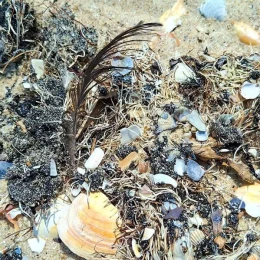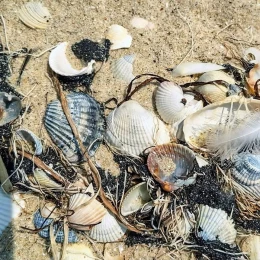New fuel oil spill found on Black Sea coast in Odesa region
- Alona Kokhanchuk
-
•
-
10:13, 05 June, 2025
Employees of the National Nature Park «Tuzly Estuaries» have recorded another case of fuel oil pollution on the Black Sea coast.
This was reported by the park's ecologist Ivan Rusev.
According to him, a stain of fuel oil of various fractions weighing about 1 kg was found on a two-kilometre stretch of sandy embankment near the strait between the estuaries and the sea. The substance was collected promptly. Due to the heat (+30°C), the fuel oil was soft and washed ashore along with seagrass and shells.
Ivan Rusev suggests that the fuel oil could have washed ashore as a result of wind and underwater currents that tore vegetation from the seabed. The environmentalist also does not rule out the presence of similar spots in other parts of the Odesa coast that have not yet been surveyed. Some of the fuel oil could have been covered by sand brought by the wind.
In addition, the death of the Black Sea atherina was recorded in the Burnas estuary. Ivan Rusiev attributes this to the possible impact of fuel oil residues that spread after the accident of Russian tankers in the Kerch Strait on 15 December 2024.
«The bulk of the fuel oil that could have reached the North-Western Black Sea from the accident site on 15 December 2024 is already dissolving with warming and «is being incorporated» into the food chains of aquatic organisms in the marine ecosystem and the Tuzly estuaries. In particular, the fuel oil probably had a negative impact on the atherina fish, which died and was washed up on the coast of the Burnas estuary near the said strait on 2 kilometres of sandy embankment», Ivan Rusiev said.
Earlier it was reported that hundreds of kilograms of fuel oil from Russian tankers still remain in Odesa region near the Danube Nature Reserve. The problem may become more acute with the heat.



